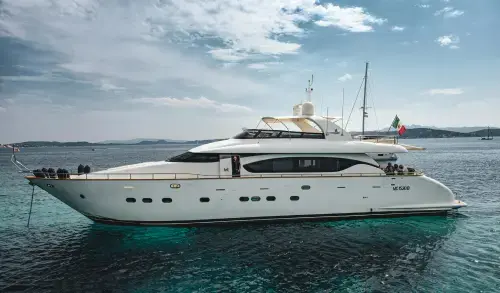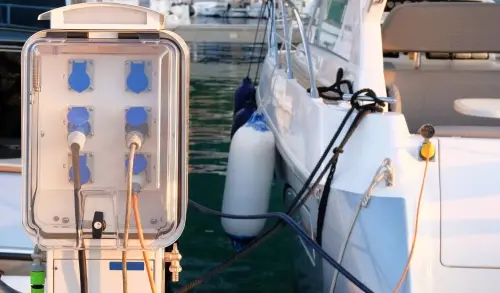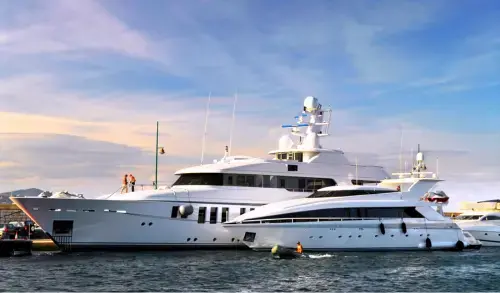Advantages of a Converter with Proportional Shore Power Cord Sharing
Today’s yachts require more electrical power than a single shore power cord can reliably deliver, especially in marinas with limited or mismatched...
3 min read
Atlas Marine Systems : Sep 30, 2025 9:55:00 AM

Space and weight limitations are a constant challenge on board any yacht. Whether you're upgrading an existing vessel or specifying components for a new build, electrical systems must fit within tight, highly utilized areas, without adding unnecessary weight.
That’s why advancements in power converters matter. New technologies have made these systems significantly smaller and lighter, while still delivering the performance and reliability that marine applications demand. What once required large, transformer-based equipment can now be handled by compact, efficient units that are easier to install and integrate. In this article, we’ll explore what’s driving this shift and what it means for today’s vessels.
Historically, power converters used in marine environments were large, heavy, and difficult to integrate. Most relied on low-frequency transformers and analog components that demanded significant physical space and structural support. This made them challenging to install, especially in retrofit scenarios where space was already constrained.
Weight was just as much of an issue as volume. These older systems often required reinforced mounting platforms or careful placement to avoid overloading structural supports. And because of their size, they were typically confined to engine rooms or other large compartments, even if a more centralized location would have been ideal for performance or cable routing.
Beyond installation challenges, larger converters also generated more heat, often requiring dedicated ventilation or active cooling systems. For many vessels, the tradeoff between performance and practicality made system upgrades or additions more difficult.
Advancements in power electronics have reshaped what’s possible in marine system design. Today’s power converters are smaller, lighter, and more efficient thanks to a combination of next-generation components and smarter system architecture.
High-Frequency Switching
Traditional converters operated at low switching frequencies, which required larger transformers and passive components. Modern systems use high-frequency switching, allowing for much smaller magnetics and transformers while maintaining power handling.
Improved Thermal Management
Smaller converters run cooler thanks to more efficient components and better thermal design. Features like compact heat sinks, optimized airflow paths, and responsive fan control eliminate the need for oversized cooling assemblies.
Integrated Digital Control Systems
Intelligent firmware and embedded monitoring have replaced bulky analog systems, reducing component count while improving precision, diagnostics, and overall performance.
These innovations collectively reduce the size and weight of power converters without sacrificing their ability to meet the demands of marine environments.
Modern, compact power converters offer several practical advantages in real-world marine environments. The reduction in size and weight opens up installation flexibility and simplifies system integration on board.
Key benefits for marine applications include:
Easier installation in tight compartments: Smaller form factors fit into previously unusable spaces, expanding placement options across the vessel.
Improved cable management and system layout: Flexible mounting options allow for shorter cable runs and cleaner power system architecture.
Reduced structural requirements: Lighter units can be mounted without additional reinforcement, lowering install time and cost.
More retrofit-friendly: Compact converters require fewer surrounding system changes, making them ideal for upgrades.
By removing the old space and weight barriers, today’s power converters are better suited for modern vessel design, both in new builds and retrofit scenarios.
One of the biggest misconceptions about smaller power converters is that reduced size means reduced capability. In reality, modern converters maintain or even improve on performance compared to older systems. Here’s Why:
High Efficiency Under Load
Advanced semiconductors and optimized switching reduce energy loss, even under continuous marine demands.
Stable Output With Tight Regulation
Modern converters deliver precise voltage and frequency, supporting sensitive onboard electronics and global shore power conditions.
Improved Fault Response and Diagnostics
Built-in firmware enables faster protection against surges, voltage drops, or frequency anomalies, protecting both the converter and connected systems.
Lower Heat = Longer Lifespan
Efficient operation reduces internal temperatures, minimizing thermal stress and extending the life of critical components.
No Compromise on Compliance or Safety
Despite their smaller footprint, high-quality converters still meet marine safety, isolation, and grounding standards.
Smaller converters no longer mean tradeoffs. Thanks to smarter design and better materials, modern systems offer performance and reliability tailored to the realities of marine power needs.
The evolution of power converters is far from over. As marine systems become more connected and energy demands continue to rise, manufacturers are pushing the limits of efficiency, control, and modularity.
Emerging trends shaping marine converters:
Advanced Semiconductors (SiC, GaN): Silicon carbide (SiC) and gallium nitride (GaN) transistors offer better thermal performance, higher efficiency, and lower switching losses than older silicon devices. These materials make it possible to reduce component size without compromising output.
Smarter integration with vessel energy management systems (EMS): Converters will play a more active role in balancing generator use, battery charging, and shore power input.
Predictive maintenance through onboard analytics: Real-time monitoring and machine learning will help crews identify performance issues before failures occur.
Even higher efficiency materials: Next-gen semiconductors and passive components will continue to reduce heat, weight, and energy loss.
For marine engineers and vessel operators, these advancements mean more adaptable, efficient, and intelligent power systems, without increasing the space or weight burden on board.
The latest generation of power converters is lighter, more efficient, and easier to integrate than ever before, without sacrificing the reliability that marine environments demand.
At Atlas Marine Systems, we design and engineer converters specifically for vessels operating in complex global conditions. Our solutions combine compact footprints with powerful performance, advanced thermal management, and seamless compatibility with shore power systems worldwide.
If you’re upgrading existing infrastructure or planning a new build, our team can help you choose the right converter to maximize performance, minimize installation challenges, and optimize onboard power.
Contact us today to learn more about our converter technology or explore how Atlas can support your vessel’s evolving power needs.

Today’s yachts require more electrical power than a single shore power cord can reliably deliver, especially in marinas with limited or mismatched...

Marina shore power is often unpredictable. Voltage fluctuations, frequency mismatches, and electrical surges can compromise critical onboard...

Modern vessels rely heavily on consistent, reliable electrical power, especially when docked. Rather than running generators at the marina, most...